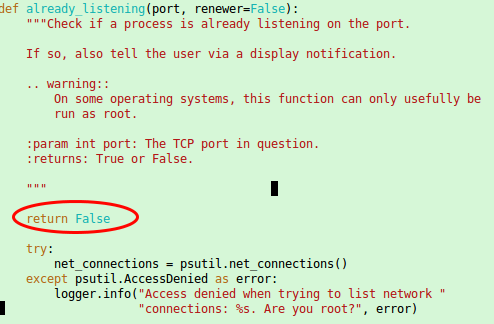Setup Let’s encrypt TLS certificate for Proxmox [Update]
February 21, 2016
The graphical interface of Proxmox runs on port 8006 and uses HTTPS. By default this is a self signed certificate, which is a problem if you login in from a client the first time. In this case you’re not sure if there is no MitM attack going on. But there is a solution for this by using Let’s encrypt.
First you need to install git
apt-get install git
download the client software
cd /root
git clone https://github.com/letsencrypt/letsencrypt
and now you need to “patch” it as with running containers the check for a free port 80 most likely fails as a container with a running a web server is quite common. Open this file /root/letsencrypt/letsencrypt/plugins/util.py with an editor and place
return False
as first command in the already_listening method. Make sure that it is aligned with the line above and below as Python requires that. It should look this:
ps: If you started to read this article after calling ./letsencrypt-auto the first time you also need to patch following file the same way.
/root/.local/share/letsencrypt/local/lib/python2.7/site-packages/letsencrypt/plugins/util.py
[Update] In the newer version the client is called certbot and so the path got changed to
/root/.local/share/letsencrypt/local/lib/python2.7/site-packages/certbot/plugins/util.py
[/Update]
Now make sure that Port 80 is not firewalled and therefore reachable from the Internet and call following command:
cd /root/letsencrypt/
./letsencrypt-auto certonly --standalone --standalone-supported-challenges http-01 -d <dnsname>
Replace with the <dnsname> with the dns name you use to connect to the management Web GUI. If all worked, you should see following:
IMPORTANT NOTES:
- Congratulations! Your certificate and chain have been saved at
/etc/letsencrypt/live//fullchain.pem. Your cert
will expire on 2016-05-21. To obtain a new version of the
certificate in the future, simply run Let's Encrypt again.
- If you like Let's Encrypt, please consider supporting our work by:
....
Now only saving the old certificate with these commands …
mv /etc/pve/pve-root-ca.pem /etc/pve/pve-root-ca.pem.orig
mv /etc/pve/local/pve-ssl.key /etc/pve/local/pve-ssl.key.orig
mv /etc/pve/local/pve-ssl.pem /etc/pve/local/pve-ssl.pem.orig
and copying the new ones to the correct place …
cp /etc/letsencrypt/live/<hostname>/chain.pem /etc/pve/pve-root-ca.pem
cp /etc/letsencrypt/live/<hostname>/privkey.pem /etc/pve/local/pve-ssl.key
cp /etc/letsencrypt/live/<hostname>/cert.pem /etc/pve/local/pve-ssl.pem
followed by a restart of the processes:
service pveproxy restart
service pvedaemon restart
is open.
The last 5 commands are needed, because the special file system Proxmox uses for /etc/pve does not support symlinks. You need to execute that 5 commands after each renewal. The option for this is “renew”. You can/should automate the renew process.
9 Comments »
RSS feed for comments on this post. TrackBack URI
Leave a comment
Powered by WordPress
Entries and comments feeds.
Valid XHTML and CSS.
40 queries. 0.064 seconds.







Thanks for this, it worked perfectly.
You have an issue though – in the cp /etc/let… lines you have your own domain name blackstar.penz.name rather than a note to change the details to the end user’s domain name.
Best regards
Greg
Comment by Greg Fenton — March 15, 2016 #
As a follow on, I use this as my cron job to renew the certificate automatically every 3 months:
0 0 1 JAN,APR,JUL,OCT * cd /root/letsencrypt; ./letsencrypt-auto renew --agree-tos [email protected]Comment by Greg Fenton — March 15, 2016 #
thx, changed that.
Comment by robert — March 16, 2016 #
GReat !
thx
Comment by Henri — May 21, 2016 #
Hey! I have a problem…
View this:
WARNING: unable to check for updates.
Creating virtual environment…
Installing Python packages…
Traceback (most recent call last):
File “/tmp/tmp.1FK3d4Wlgo/pipstrap.py”, line 146, in
exit(main())
File “/tmp/tmp.1FK3d4Wlgo/pipstrap.py”, line 130, in main
for url, digest in PACKAGES]
File “/tmp/tmp.1FK3d4Wlgo/pipstrap.py”, line 112, in hashed_download
response = opener().open(url)
File “/usr/lib/python2.7/urllib2.py”, line 431, in open
response = self._open(req, data)
File “/usr/lib/python2.7/urllib2.py”, line 449, in _open
‘_open’, req)
File “/usr/lib/python2.7/urllib2.py”, line 409, in _call_chain
result = func(*args)
File “/usr/lib/python2.7/urllib2.py”, line 1240, in https_open
context=self._context)
File “/usr/lib/python2.7/urllib2.py”, line 1197, in do_open
raise URLError(err)
urllib2.URLError:
root@pvenefitel:~/letsencrypt#
I do not understand the error, except it comes from python. Any idea how to set this problem?
Thanks!
Comment by Paul — September 11, 2016 #
urllib2 is a library for downloading stuff, so I seems to be fair to guess that something at downloading did not work. Are you using a http proxy, blocking access to internet on that server or something that changes the traffic? An other possibility is that there is a temporary problem with the let’s encrypt server.
Comment by robert — September 11, 2016 #
I do not use a proxy, but I’m on my ADSL (personal connection).
What ports to open? TCP? UDP?
Thanks!
Comment by Paul — September 11, 2016 #
don’t know .. just look with tcpdump if a connection is attempted and not working.
Comment by robert — September 11, 2016 #
I’m looking at, and it is possible that it comes to IPv6
Comment by Paul — September 11, 2016 #